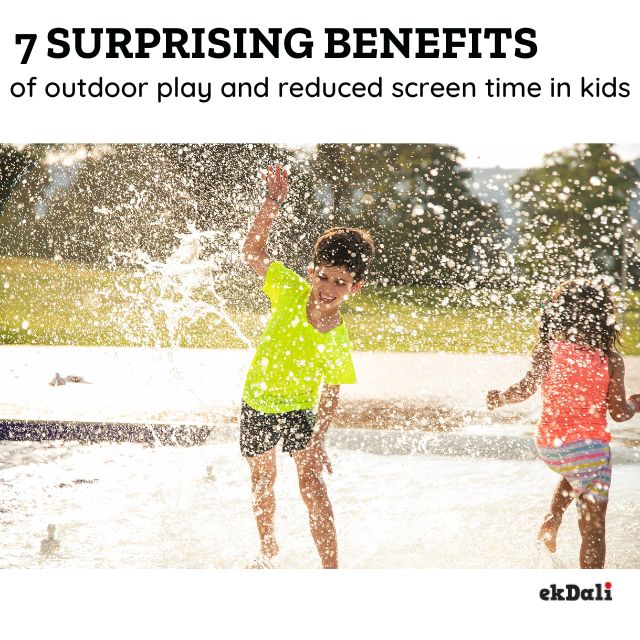How big is the screen problem ?
A research conducted by an institute that studies families, found that kids aged 8 - 18 years spend on an average of 8 hours a day on the screen. This does not include the time they spend on the screen for educational purposes. In a year this would be close to whopping 115 days in front of the screen
Contrast this with the amount of outdoor play time. Unstructured outdoor play on an average is less than ½ hour daily. Forget any social learning, this much time is not even enough to get enough vitamin D
In addition to common sense things like more movement, more physical fitness and more social learning, outdoor play has a lot of advantages
Before you jump into the article, we thought you might like to take a look at some of our flashcards and posters for kids that are designed to help kids have screen free time
-
Outdoor Play inspires creativity in kids
Since creativity is a means of self-expression and a fundamental talent for handling emotions and resolving issues, it is crucial to foster it. Additionally, it fosters social, linguistic, and literary growth.
Children's inherent sense of wonder, curiosity, and creativity are stimulated when they play outside and are encouraged to explore. Unstructured play is when kids create their own games. With creative ways of looking at the world, they sort things out, deal with issues, and pass the time.
-
Outdoor play increases mental wellness
The body produces Vitamin D, which is necessary for the immune system and bone growth, with the aid of sunlight exposure in children. Additionally, vitamin D helps people feel happier and sleep soundly.
It's beneficial for both kids physical and emotional wellbeing to get some sunshine each day!Physical activity, according to experts, improves children's attitude on life by boosting self-esteem, reducing anxiety and sadness, and improving cognitive abilities.
Exercise also produces endorphins, which are linked to happier children.
-
Outdoor play creates opportunities to socialize
Unstructured play with other kids is crucial for kids to develop their social skills. It teaches kids how to establish friendships, handle problems, share, and be kind to others. They learn negotiation skills, leadership and teamwork
Children do not have enough opportunities to develop their own norms and standards of engagement when they are just interacting with other students in the classroom and hence social learning in such structured environments is limited
-
Outdoor Play reduces stress and anxiety in children
Children who engage with screens quickly receive feedback, which trains them to anticipate the same instant gratification in real life. When the real world moves slower than on a computer, children becoming more impatient, frustrated, angry, and distressed.Several studies have connected children's excessive screen usage to higher levels of stress, anxiety, and melancholy. Playing outside has been found to reduce tension and anxiety, whereas screens can aggravate these feelings.
-
Outdoor play keeps children active
The word "exercise" doesn't always sound like fun. But Running, leaping, dancing, throwing a ball, or riding a bike are enjoyable methods for kids to move their bodies and maintain their health, even though. Lower BMI and improved general health (including a decreased risk of conditions like diabetes, asthma, and cardiovascular disease) are the benefits of this. Children's energy can be released through physical activity, which helps them focus and sleep better. Children's motor skills and muscular strength are also improved.
-
Outdoor Play builds confidence
Giving kids the flexibility to design their own games and discover the world—or at the very least, their backyard—helps them develop a self-assured sense of power and independence.
Children experiment and take chances as they explore the outdoors. Ultimately, letting kids take risks (within reason) helps them develop their confidence. Either they discover a new skill or they fail a little and learn that it's really not so bad after all.
-
Outdoor Play teaches them responsibility
When kids are on their own playing, they know they should take care of their belongings like balls, bats etc. They also know they should be careful about ensuring the ball doesnt break a glass or shatter a window.
They learn to clean up after playing, This sense of responsibility developed outdoor often translated into more sense of responsibility in their other activities like school work and other chores around the house
At Ekdali, we believe kids need to spend as much time outside screen as possible. All our maps, posters and flashcards are designed to have a fun learning experience outside the screen.
























